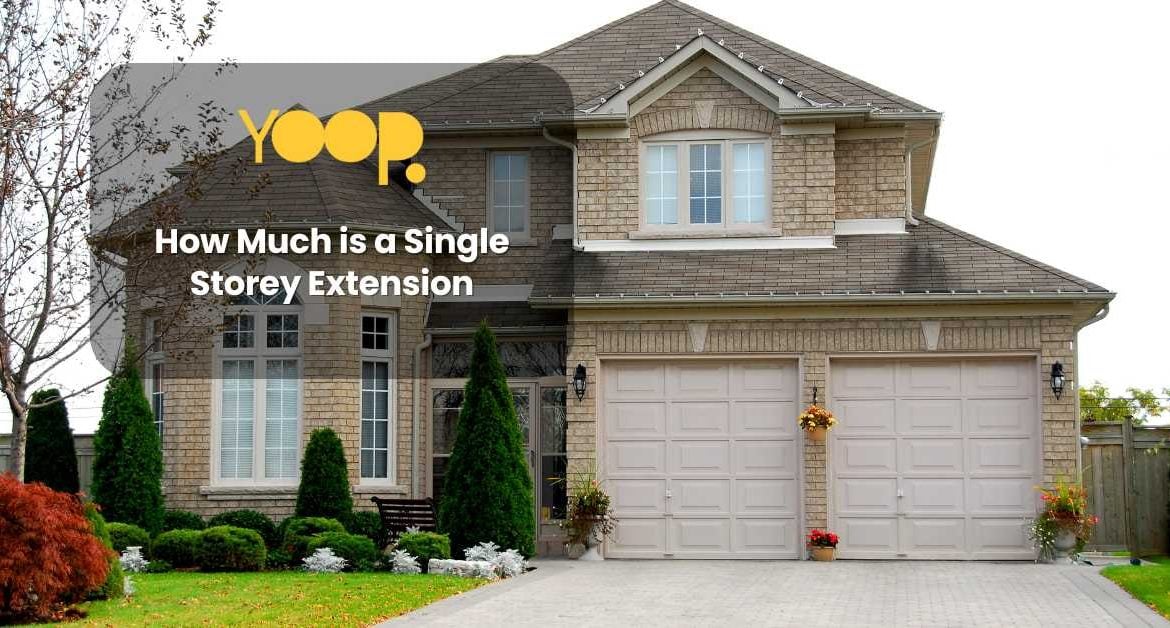

Home extensions have become increasingly popular in the UK. Single storey extensions, in particular, are a favourite among homeowners.
These extensions offer numerous benefits. They provide extra living space, enhance property value, and allow for customised design. Trends show that many people use single storey extensions for open-plan kitchens, additional bedrooms, or home offices. The versatility of these extensions makes them a practical choice for many families.
Understanding the cost of a single storey extension is crucial. Knowing the expenses involved helps in budgeting and planning. It prevents unexpected financial burdens.
Moreover, it ensures that the project stays within the set budget. It also aids in making informed decisions about materials, design, and contractors.
There are several factors influencing the cost of a single storey extension. Location is a key factor, as costs vary across regions. The size and design of the extension also play a significant role. Materials used can significantly impact the overall cost.
Labour costs, too, can differ based on location and the complexity of the work. Understanding these factors can help in estimating the total expenditure more accurately.
The purpose of this article is to provide a comprehensive guide. It will cover all aspects of a single storey extension. From planning and design to construction and finishing, this guide aims to offer valuable insights. It will help homeowners make well-informed decisions.
By the end, readers will have a clear understanding of what to expect financially when embarking on such a project.
A single storey extension is a great way to transform your home to better suit your lifestyle. Moreover, it is typically the best way to add value to your property. They can also be a great opportunity to get more natural light into your home with the use of roof lights and bi-fold doors.
There are two types of single storey extensions:
Rear Single Storey Extension
The rise of the kitchen at the heart of the house creates a very liveable home . Particularly, a kitchen/dining/living space is easy to create with a rear extension. Up to 8 metres (for a detached house)/6 meters (for a semi-detached/terraced house) from the original rear of the property can be typically achieved via Permitted Development. However, larger single-storey rear extensions are subject to the Neighbour Consultation Scheme.
Side Single Storey Extension
Unlock extra functionality in your home with a side extension! These clever additions, up to half the width of your existing house, provide the perfect space for utility rooms, studies. Or even a cozy bedroom (depending on the size).
How much does a single storey extension cost?
Build Costs
A good place to start is to work out how big the extension will be. This is the main governing factor of the cost of an extension. Typically if you worked out a square meter at £1500, that’s a good base price for basic quality build costs.
For an average single storey extension of 20 square metres, the build cost would be from £30,000 for basic quality build costs.
A single storey extension of 20 square metres of basic quality will will cost you a minimum of £44,000 including most fees, but excluding interior fit-out costs.
– Yoop Architects
TWEET THIS
Interior Fit-Out Costs of single storey extension
(These costs are in addition to the build cost of the single storey extension)
- Kitchen
Budget from £7,000 to £15,000 – the biggest cost factor is the appliances – the better the appliances, the higher the cost - Bathroom
Budget around £5,000 assuming you can connect to existing pipework - Utility Room
Budget from £1,500 to £11,000 depending on size and quality of appliances - New Boiler
Budget from £2,000 to £3,000 depending if the boiler is being fitted in an existing or new location - Flooring
Budget from £25 to £100 per square metre - Underfloor Heating
Budget from £10,000 to £15,000 - Wall and Ceiling Finishes
Budget around £85 per square metre for plaster or dry-lining plus paint - Bi-fold or Sliding Doors
Budget from £1,500 to £2,000 per linear metre
Professional Fees for single storey extension
- Measured survey – £500 to £1,500
- Planning and construction drawings – £2,700 to £4,000
- Architect design fees – three to seven percent of the build cost (e.g. a fee of £900 to £2,100 for a £30,000 extension)
- Structural engineer – £500 to £1,000
- Contract management (employing someone to hire the builders/tradesmen) – three to seven percent of the build cost (e.g. a fee of £900 to £2,100 for a £30,000 extension)
- Project management by a building contractor or architect will be 15 to 20 percent (up to £4,500) on top of the net cost of labour, materials and overheads
- VAT at 20 percent of the labour, materials and services if applicable
A single storey extension of 20 square metres at a build cost of £30,000 could potentially attract professional fees from £12,000.
Permission Fees
Additional reports that may be required
- Tree report (requires an arboriculturist) – from £300
- Ecological ‘Phase 1’ report (required if your project might impact protected species) – from £600
- Flood risk/drainage/archaeological/environmental assessment – from £350
(If problems are found, then this will add additional charges to rectify the issue) - Historic building report (if your home is a listed building) – £750 to £1,000 on average for a typical three-bedroom listed building
Other
- Building Regulations Approval
You don’t need to get approval yourself if you use someone registered with a competent person scheme. If you are carrying out the building works yourself. Or you’re working with someone who’s not registered with a competent person scheme. Then budget from £400 – £750 - Party Wall Agreement
(Covers shared walls/structures and protects both yourself and your neighbours whilst work is being carried out) You can issue a Party Wall Notice yourself (for no charge) to each of your affected neighbours. If your neighbour agrees to the works in writing, you will not require a Party Wall Agreement.If the neighbour refuses to give consent or fails to respond within 14 days. Then a surveyor will need to be appointed to arrange a Party Wall Award that will set out the details of the work which will carry a fee of £700 to £1,000 per neighbour - Build Over Agreement
(If you’ve got a shared drain running across the back of your garden and you’re going to build over it or within three meters proximity)
Budget around £335
All together, it’s worth setting aside at least £2,000 to cover any fees for permissions and sign off
Insurance
If you are carrying out conversion/extension works you should arrange specialist insurance to cover the new works. Along with the existing structure as most home insurers won’t cover works if contracts exceed £50,000. For expert advise on this and any other insurance exposures for single storey extension, please contact Gary Philip at GPS Insurance Brokers on 020 8207 7385. GPS Insurance
Share this…
Total Cost for Single Storey extensions
For a single storey extension of 20 square metres of basic quality. This will give you a minimum spend of £44,000 including most fees, but excluding interior fit-out costs.
Getting An Accurate Figure
To calculate the cost of your project, Yoop Architects take a measured survey of your property. Which captures all the information. Then we draw it all up in 3D and create sketches to show sometimes five or six options if it’s not entirely clear how you want to achieve your brief.
A lot of the times there are different ways of achieving your desired result. Additionally, the more you work with the building, the cheaper, easier and faster your build will be. Once you’ve got a favorite scheme or a couple of favorite schemes, we have a phase called ‘Meet the Builders‘. That’s when we can introduce you to a couple of builders. They visit the property and they give you a ballpark figure.

Factors Influencing the Cost
Location
Location significantly affects the cost of a single storey extension. Regional cost differences play a major role. In London and the South East, you can expect higher prices due to demand and living costs. Conversely, the North of England and rural areas often have lower costs.
Local regulations and permits also impact expenses. Different councils have varying planning requirements. Meeting these regulations may involve additional paperwork and fees. Therefore, it is crucial to research local guidelines early in the planning process.
Size and Design
The size and design of your extension directly influence the overall cost. A larger extension naturally requires more materials and labour, increasing expenses. However, the complexity of the design is equally important. Simple, straightforward designs are more cost-effective.
In contrast, intricate designs with custom features or unique architectural elements will raise costs. Opting for a minimalist design can help keep the budget manageable. Always consider how both size and design choices will affect your project’s total cost.
Materials
Materials used in the construction significantly impact the cost. For instance, brick, timber, and steel all come with different price tags. Bricks are traditional and durable but can be expensive. Timber offers a rustic appeal and can be cheaper but might require more maintenance.
Steel provides a modern look and is strong but comes at a higher cost. The quality of materials also matters. High-quality materials ensure longevity and aesthetic appeal but at a premium price. Balancing quality and cost is essential to staying within budget while achieving desired results.
Labour Costs
Labour costs vary widely across the UK. In urban areas like London, labour charges tend to be higher due to the cost of living. In contrast, rural areas might offer more affordable rates.
The importance of skilled labour cannot be overstated. Hiring experienced professionals ensures quality work and avoids future repairs. It’s wise to obtain multiple quotes to compare prices and services.
Investing in skilled labour might seem expensive initially, but it often saves money in the long run by preventing costly mistakes.
Average Cost Breakdown
Planning and Design
Planning and design stages incur initial costs. Architectural fees cover the creation of detailed plans and drawings. These plans are essential for obtaining planning permission and guiding the construction process. Planning permission costs vary depending on the local council and the complexity of the project.
Ensuring all designs meet regulatory standards is crucial. Early investment in good planning and design helps prevent costly changes during construction. This stage sets the foundation for a smooth and efficient build.
Construction Costs
Construction costs encompass several components. Foundation and structural work form the base of the extension. These are critical and must be done correctly to avoid future issues.
Building the extension includes erecting walls, installing roofs, and creating the basic structure. These costs can vary based on the materials used and the complexity of the design.
It’s important to allocate a significant portion of the budget to construction, as this stage is vital to the extension’s stability and longevity.
Finishing Touches
Finishing touches add the final layers of your extension. Interior finishes like flooring and painting enhance the space’s aesthetic appeal. Quality finishes can transform an extension into a comfortable living area.
Fixtures and fittings, such as lighting, kitchen units, and bathroom accessories, also contribute to the overall cost. These elements should be chosen carefully to match your design vision and budget.
Investing in durable and stylish finishes ensures long-term satisfaction and adds value to the property.
Frequently Asked Questions (FAQs)
What is the average cost of a single storey extension in the UK?
The cost of a single storey extension in the UK varies based on several factors. These include location, size, design, materials, and labour. Urban areas, especially London and the South East, often have higher costs compared to rural regions. Size and design complexity can significantly influence the price. Using high-quality materials and skilled labour will also impact the total cost. Obtaining multiple quotes from different builders is essential to get an accurate estimate and ensure you are making an informed decision.
How long does it take to build a single storey extension?
Building a single storey extension typically takes between three to six months. This timeframe includes the planning, design, and construction phases. The planning and design stages can take one to two months, depending on the complexity and obtaining necessary permissions. The construction phase usually lasts two to four months. Factors like weather, availability of materials, and the builder’s schedule can affect this timeline. Proper planning and coordination with your builder can help keep the project on track.
Do I need planning permission for a single storey extension?
Planning permission for a single storey extension may be required, depending on the project’s specifics. Some extensions fall under permitted development rights, allowing construction without formal permission. However, these rights come with restrictions regarding size, height, and location. It is crucial to check with your local council to understand the regulations that apply to your project. Securing the necessary approvals early helps avoid delays and potential fines.
How can I keep costs down when building an extension?
You can manage costs effectively through careful planning and budgeting. Opting for a straightforward design can reduce construction complexity and expenses. Selecting cost-effective materials that still meet quality standards can also help. Obtaining multiple quotes from reputable builders enables you to compare prices and services. Clear communication with your builder about your budget and expectations is essential to avoid unexpected costs.
What materials are best for a single storey extension?
The best materials for a single storey extension depend on your budget, design preferences, and the extension’s intended use. Brick offers durability and a timeless look, while timber provides a warm, natural appearance. Steel is strong and modern but typically more expensive. It is important to balance quality and cost when selecting materials. Consulting with an architect or builder can help you make informed choices that align with your vision and budget.
Can I live in my house while the extension is being built?
Living in your house during construction is possible but may be challenging. Construction work can be noisy and disruptive, and there may be dust and debris. It is important to create a clear plan with your builder to minimise disruptions. Designate safe, construction-free areas for daily living. In some cases, temporary relocation might be necessary, especially if the work affects essential living areas like the kitchen or bathroom.
How do I choose a reliable builder for my extension?
Choosing a reliable builder involves several steps. Start by seeking recommendations from friends or family who have completed similar projects. Research online reviews and testimonials to gauge the builder’s reputation. Verify the builder’s credentials and memberships in professional organisations. Obtain multiple quotes and compare them. Meeting potential builders to discuss your project and assess their communication skills is crucial. A reliable builder should provide a detailed contract outlining costs, timelines, and responsibilities.
What are the benefits of a single storey extension?
A single storey extension offers many benefits. It provides additional living space, enhancing your home’s functionality. This new space can serve various purposes, such as a new kitchen, living room, or home office. Extensions also increase property value, making them a valuable investment. Customisable designs allow you to tailor the space to your specific needs and preferences. Additionally, extending your home can be a more cost-effective solution than moving to a larger property.
How do I finance a single storey extension?
Financing a single storey extension can be done through several methods. Personal savings are a straightforward option. Home improvement loans allow you to spread the cost over time. Remortgaging your property to release equity is another common approach. It is also worth checking for government grants or incentives, especially for energy-efficient projects. Consulting a financial advisor can help you choose the best financing option for your situation, ensuring you manage your finances effectively.
What are the potential challenges of building a single storey extension?
Building a single storey extension can present several challenges. Planning permission and regulatory compliance can be complex and time-consuming. Effective budget management is crucial to avoid overspending. Unforeseen issues, such as structural problems or adverse weather, can cause delays. Coordinating multiple contractors and ensuring quality workmanship requires careful oversight. Proper planning, hiring experienced professionals, and maintaining clear communication can help mitigate these challenges, ensuring a smooth construction process.
To help navigate these challenges, consider working with YOOP Architects.
They offer expert guidance in design, planning permissions, and execution. Their professional services can ensure your project runs smoothly from start to finish.
Why Pick Yoop Architects for Your Single-Storey Extension?
At Yoop Architects, we put our technical know-how, creativity, and time efficiency into any project to make sure your single-storey extension is designed and constructed to the highest standard. Our custom approach will help you to strike the perfect balance between what works for you, practicality, aesthetics, and budget.
A clear picture of costs will be established according to your needs and vision, providing you with bespoke design solutions that suit your lifestyle. Transparency stands out in our working approach; there are no hidden fees, and you will always be kept informed in every step. Covering the entire timeline from the initial consultation to the completion of construction, we support you in such a way that extension projects will run smoothly and easily for you.
Let Us Build Your Dream Extension
A properly designed single-storey extension can do wonders for your house in terms of space and comfort. With Yoop Architects, we simplify the process for you; we have taken care of everything from design through planning permissions to construction. We aim to create an extension that brings your house prolonged value while also meeting your practical needs.
Contact us today to discuss your project and take that step towards your dream extension.

